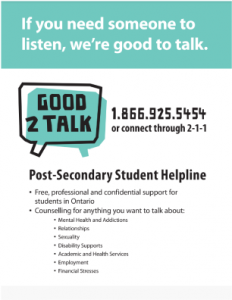9 Successful students practice mental wellness

Wellness is more than just avoiding disease. Wellness involves feeling good in every respect, in mind and spirit as well as in body. Your emotional health is just as important as your physical health—and maybe more so. If you’re unhappy much of the time, you will not do as well as in college—or life—as you can if you’re happy. You will feel more stress, and your health will suffer. Still, most of us are neither happy nor unhappy all the time. Life is constantly changing, and our emotions change with it. But sometimes we experience more negative emotions than normally, and our emotional health may suffer. Emotional balance is an essential element of wellness—and for succeeding in college. Emotional balance doesn’t mean that you never experience a negative emotion, because these emotions are usually natural and normal. Emotional balance means we balance the negative with the positive, that we can be generally happy even if we’re saddened by some things. Emotional balance starts with being aware of our emotions and understanding them.
Everyone knows about stress, but not everyone knows how to control it. Stress is the great enemy of college success. But once you’ve learned how to reduce it where you can and cope with unavoidable stress, you’ll be well on the road to becoming the best student you can be. We all live with occasional stress. Since college students often feel even more stress than most people, it’s important to understand it and learn ways to deal with it so that it doesn’t disrupt your life.
Emotional Health
Emotions Can Be Problematic
When is an emotion problematic? Is it bad to feel anxious about a big test coming up or to feel sad after breaking up a romantic relationship?
It is normal to experience negative emotions. College students face so many demands and stressful situations that many naturally report often feeling anxious, depressed, or lonely. These emotions become problematic only when they persist and begin to affect your life in negative ways. That’s when it’s time to work on your emotional health, just as you’d work on your physical health when illness strikes.
Anxiety
Anxiety is one of the most common emotions college students experience, often as a result of the demands of college, work, and family and friends. It’s difficult to juggle everything, and you may end up feeling not in control, stressed, and anxious. Anxiety typically results from stress. Some anxiety is often a good thing if it leads to studying for a test, focusing on a problem that needs to be resolved, better management your time and money, and so on. But if anxiety disrupts your focus and makes you freeze up rather than take action, then it may become problematic. Using stress-reduction techniques often helps reduce anxiety to a manageable level.
Anxiety is easier to deal with when you know its cause. Then you can take steps to gain control over the part of your life causing the anxiety. But anxiety can become excessive and lead to a dread of everyday situations.
There are five types of more serious anxiety:
- Generalized anxiety disorder is characterized by chronic anxiety, exaggerated worry and tension, even when there is little or nothing to provoke it.
- Obsessive-compulsive disorder (OCD) is characterized by recurrent, unwanted thoughts (obsessions), repetitive behaviors (compulsions), or both.
- Panic disorder is characterized by unexpected and repeated episodes of intense fear accompanied by physical symptoms.
- Post traumatic stress disorder (PTSD) can develop after exposure to a terrifying event or ordeal in which grave physical harm occurred or was threatened.
- Social phobia (or social anxiety disorder) is a persistent, intense, and chronic fear of being watched and judged by others and being embarrassed or humiliated by one’s own actions.
These five types of anxiety go beyond the normal anxiety everyone feels at some times. If you feel your anxiety is like any of these, see your health-care provider. Effective treatments are available to help you regain control.
Loneliness

Loneliness is a normal feeling that most people experience at some time. College students away from home for the first time are likely to feel lonely at first. Older students may also feel lonely if they no longer see their old friends. International students may also feel lonely. Loneliness involves not feeling connected with others. One person may need only one friend to not feel lonely; others need to feel more connected with a group. There’s no set pattern for feeling lonely.
If you are feeling lonely, there are many things you can do to meet others and feel connected. Don’t sit alone in your room bemoaning the absence of friends. That will only cause more stress and emotional distress. You will likely start making new friends through going to classes, working, studying, and living in the community. But you can jump-start that process by taking active steps such as these:
• Realize you don’t have to be physically with friends in order to stay connected. Many students use social Web sites to stay connected with friends at other colleges or in other locations. Telephone calls, instant messaging, and e-mail work for many.
• Understand that you’re not alone in feeling lonely. Many others like you are just waiting for the opportunity to connect, and you will meet them and form new friendships fast once you start reaching out.
• Become involved in campus opportunities to meet others. Every college has a wide range of clubs for students with different interests. If you’re not the “joiner” type, look for individuals in your classes with whom you think you may have something in common and ask them if they’d like to study for a test together or work together on a class project.
• Remember that loneliness is a temporary thing—it’s only a matter of time until you make new friends. If your loneliness persists and you seem unable to make friends, then it’s a good idea to talk with one of the college counsellors. They can help.
Depression
Depression, like anxiety and loneliness, is commonly experienced by college students. It may be a mild sadness resulting from specific circumstances or be intense feelings of hopelessness and helplessness.
Many people feel depressed from time to time because of common situations:
- Feeling overwhelmed by pressures to study, work, and meet other obligations
- Not having enough time (or money) to do the things you want to do
- Experiencing problems in a relationship, friendship, or work situation
- Feeling overweight, unhealthy, or not in control of oneself
- Feeling that your new life as a student lacks some of the positive dimensions of your former life
- Not having enough excitement in your life
Depression, like stress, can lead to unhealthy consequences such as poor sleep, overeating or loss of appetite, substance abuse, relationship problems, or withdrawal from activities that formerly brought joy. For most people, depression is a temporary state. But severe depression can have crippling effects.
Not everyone experiences the same symptoms, but the following are most common:
- Persistent sad, anxious, or “empty” feelings
- Feelings of hopelessness or pessimism
- Feelings of guilt, worthlessness, or helplessness
- Irritability or restlessness
- Loss of interest in activities or hobbies once pleasurable, including sex
- Fatigue and decreased energy
- Difficulty concentrating, remembering details, and making decisions
- Insomnia, early morning wakefulness, or excessive sleeping
- Overeating or appetite loss
- Thoughts of suicide or suicide attempts
- Persistent aches or pains, headaches, cramps, or digestive problems
If you have feelings like this that last for weeks at a time and affect your daily life, your depression is more severe than “normal,” temporary depression. It’s time to see your health-care provider and get treatment as you would for any other illness.
Stress

We all live with occasional stress. Since college students often feel even more stress than most people, it’s important to understand it and learn ways to deal with it so that it doesn’t disrupt your life. Stress is a natural response of the body and mind to a demand or challenge. The thing that causes stress, called a stressor, captures our attention and causes a physical and emotional reaction. Stressors include physical threats, such as a car we suddenly see coming at us too fast, and the stress reaction likely includes jumping out of the way—with our heart beating fast and other physical changes. Most of our stressors are not physical threats but situations or events like an upcoming test or an emotional break-up. Stressors also include long-lasting emotional and mental concerns such as worries about money or finding a job.
What Causes Stress?
Not all stressors are bad things. Exciting, positive things also cause a type of stress, called eustress. Falling in love, getting an unexpected sum of money, acing an exam you’d worried about—all of these are positive things that affect the body and mind in ways similar to negative stress: you can’t help thinking about it, you may lose your appetite and lie awake at night, and your routine life may be momentarily disrupted. But the kind of stress that causes most trouble results from negative stressors.
Life events that usually cause significant stress include the following:
- Serious illness or injury
- Serious illness, injury, or death of a family member or loved one
- Losing a job or sudden financial catastrophe
- Unwanted pregnancy
- Divorce or ending a long-term relationship (including parents’ divorce)
- Being arrested or convicted of a crime
- Being put on academic probation or suspended
Life events like these usually cause a lot of stress that may begin suddenly and disrupt one’s life in many ways. Fortunately, these stressors do not occur every day and eventually end—though they can be very severe and disruptive when experienced. Some major life stresses, such as having a parent or family member with a serious illness, can last a long time and may require professional help to cope with them.
Everyday kinds of stressors are far more common but can add up and produce as much stress as a major life event:
- Anxiety about not having enough time for classes, job, studies, and social life
- Worries about grades, an upcoming test, or an assignment
- Money concerns
- Conflict with a roommate, someone at work, or family member
- Anxiety or doubts about one’s future or difficulty choosing a major or career
- Frequent colds, allergy attacks, other continuing health issues
- Concerns about one’s appearance, weight, eating habits, and so on.
- Relationship tensions, poor social life, loneliness
- Time-consuming hassles such as a broken-down car or the need to find a new apartment
Thought Exercise
Take a moment and reflect on the list above. How many of these stressors have you experienced in the last month? The last year? What additional things cause stress?
How many stressors have you thought of? There is no magic number of stressors that an “average” or “normal” college student experiences—because everyone is unique. In addition, stressors come and go: the stress caused by a midterm exam tomorrow morning may be gone by noon, replaced by feeling good about how you did. Still, most college students are likely to experience about half the items on this list. But it’s not the number of stressors that counts. You might have only one item on that list—but it could produce so much stress for you that you’re just as stressed out as someone else who has all of them. The point of this thought exercise is to start by understanding what causes your own stress as a base for learning what to do about it.
What’s Wrong with Stress?
Physically, stress prepares us for action: the classic “fight-or-flight” reaction when confronted with a danger. Our heart is pumping fast, and we’re breathing faster to supply the muscles with energy to fight or flee. Many physical effects in the body prepare us for whatever actions we may need to take to survive a threat. But what about nonphysical stressors, like worrying about grades? Are there any positive effects there? Imagine what life would feel like if you never had worries, never felt any stress at all. If you never worried about grades or doing well on a test, how much studying would you do for it? If you never thought at all about money, would you make any effort to save it or make it? Obviously, stress can be a good thing when it motivates us to do something, whether it’s study, work, resolving a conflict with another, and so on. So it’s not stress itself that’s negative—it’s unresolved or persistent stress that starts to have unhealthy effects.

Chronic (long-term) stress is associated with many physical changes and illnesses, including the following:
- Weakened immune system, making you more likely to catch a cold and to suffer from any illness longer
- More frequent digestive system problems, including constipation or diarrhea, ulcers, and indigestion
- Elevated blood pressure
- Increased risk of diabetes
- Muscle and back pain
- More frequent headaches, fatigue, and insomnia
- Greater risk of heart attack and other cardiovascular problems over the long term
Chronic or acute (intense short-term) stress also affects our minds and emotions in many ways:
- Difficulty thinking clearly or concentrating
- Poor memory
- More frequent negative emotions such as anxiety, depression, frustration, powerlessness, resentment, or nervousness—and a general negative outlook on life
- Greater difficulty dealing with others because of irritability, anger, or avoidance
No wonder we view stress as such a negative thing! As much as we’d like to eliminate all stressors, however, it just can’t happen. Too many things in the real world cause stress and always will.
Unhealthy Responses to Stress
Since many stressors are unavoidable, the question is what to do about the resulting stress. A person can try to ignore or deny stress for a while, but then it keeps building and starts causing all those problems. So we have to do something. Consider first what you have typically done in the past when you felt most stressed. Here are a few examples of how college students have responded to stress.
- Drinking alcohol
- Drinking lots of coffee
- Sleeping a lot
- Eating too much
- Eating too little
- Smoking or drugs
- Having arguments
- Sitting around depressed
- Watching television or surfing the Web
- Complaining to friends
- Exercising, jogging, biking
- Practicing yoga or tai chi
- Meditating
- Using relaxation techniques
- Talking with an professor or counsellor
What’s wrong with the first ten stress-reduction behaviors listed first? Why not watch television or get a lot of sleep when you’re feeling stressed, if that makes you feel better?
While it may feel better temporarily to escape feelings of stress in those ways, ultimately they may cause more stress themselves. If you’re worried about grades and being too busy to study as much as you need to, then letting an hour or two slip by watching television will make you even more worried later because then you have even less time. Eating too much may make you sluggish and less able to focus, and if you’re trying to lose weight, you’ll now feel just that much more stressed by what you’ve done. Alcohol, caffeine, smoking, and drugs all generally increase one’s stress over time. Complaining to friends? Over time, your friends will tire of hearing it or tire of arguing with you because a complaining person isn’t much fun to be around. So eventually you may find yourself even more alone and stressed.
Yet there is a bright side: there are lots of very positive ways to cope with stress that will also improve your health, make it easier to concentrate on your studies, and make you a happier person overall. The last five items on our list are more positive ways to cope.
Coping with Stress
Think about your list of stressors. For each, consider whether it is external (like bad job hours or not having enough money) or internal, originating in your attitudes and thoughts.

You may be able to eliminate many external stressors. Talk to your boss about changing your work hours. If you have money problems, work on a budget you can live with, look for a new job, or reduce your expenses by finding a cheaper apartment, selling your car, and using public transportation.
What about other external stressors? Taking so many classes that you don’t have the time to study for all of them? Keep working on your time management skills. Schedule your days carefully and stick to the schedule. Take fewer classes next term if necessary. What else can you do to eliminate external stressors? Change apartments, get a new roommate, find better child care — consider all your options. And don’t hesitate to talk things over with one of our counsellors, who may offer other solutions.
Internal stressors, however, are often not easily resolved. We can’t make all stressors go away, but we can learn how to cope so that we don’t feel so stressed out most of the time. We can take control of our lives. We can find healthy coping strategies.
All the topics in this section involve stress one way or another. Many of the healthy habits that contribute to our wellness and happiness also reduce stress and minimize its effects.
Get Some Exercise
Exercise, especially aerobic exercise, is a great way to help reduce stress. Exercise increases the production of certain hormones, which leads to a better mood and helps counter depression and anxiety. Exercise helps you feel more energetic and focused so that you are more productive in your work and studies and thus less likely to feel stressed. Regular exercise also helps you sleep better, which further reduces stress.
Get More Sleep
When sleep deprived, you feel more stress and are less able to concentrate on your work or studies. Many people drink more coffee or other caffeinated beverages when feeling sleepy, and caffeine contributes further to stress-related emotions such as anxiety and nervousness.
Manage Your Money
Worrying about money is one of the leading causes of stress.
Adjust Your Attitude
You know the saying about the optimist who sees the glass as half full and the pessimist who sees the same glass as half empty. Guess which one feels more stress? Much of the stress you feel may be rooted in your attitudes toward school, your work—your whole life. If you don’t feel good about these things, how do you change?
To begin with, you really need to think about yourself. What makes you happy? Are you expecting your college career to be perfect and always exciting, with never a dull class or reading assignment? Or can you be happy that you are in fact succeeding in college and foresee a great life and career ahead? Maybe you just need to take a fun elective course to balance that “serious” course that you’re not enjoying so much. Maybe you just need to play an intramural sport to feel as good as you did playing in high school. Maybe you just need to take a brisk walk every morning to feel more alert and stimulated. Maybe listening to some great music on the way to work will brighten your day. Maybe calling up a friend to study together for that big test will make studying more fun. No one answer works for everyone—you have to look at your life, be honest with yourself about what affects your daily attitude, and then look for ways to make changes. The good news is that although old negative habits can be hard to break, once you’ve turned positive changes into new habits, they will last into a brighter future.
Learn a Relaxation Technique

Different relaxation techniques can be used to help minimize stress. Following are a few tried-and-tested ways to relax when stress seems overwhelming. You can learn most of these through books, online exercises, CDs or MP3s, and DVDs available at your library or student services offices. Practicing one of them can have dramatic effects.
- Deep breathing. Sit in a comfortable position with your back straight. Breathe in slowly and deeply through your nose, filling your lungs completely. Exhale slowly and smoothly through your mouth. Concentrate on your breathing and feel your chest expanding and relaxing. After five to ten minutes, you will feel more relaxed and focused.
- Progressive muscle relaxation. With this technique, you slowly tense and then relax the body’s major muscle groups. The sensations and mental concentration produce a calming state.
- Meditation. Taking many forms, meditation may involve focusing on your breathing, a specific visual image, or a certain thought, while clearing the mind of negative energy. Many podcasts are available to help you find a form of meditation that works best for you.
- Yoga or tai chi. Yoga, tai chi, and other exercises that focus on body position and slow, gradual movements are popular techniques for relaxation and stress reduction. You can learn these techniques through a class, online or from a DVD.
- Music and relaxation CDs and MP3s. Many different relaxation techniques have been developed for audio training. Simply play the recording and relax as you are guided through the techniques.
- Massage. Regular massages are a way to relax both body and mind. If you can’t afford a weekly massage but enjoy its effects, a local massage therapy school may offer more affordable massage from students and beginning practitioners.
Get Counselling
If stress is seriously disrupting your studies or your life regardless of what you do to try to reduce it, you may need help. There’s no shame in admitting that you need help, and college counsellors and health professionals are there to help.
Tips for Success: Stress
- Pay attention to, rather than ignore, things that cause you stress and change what you can.
- Accept what you can’t change and resolve to make new habits that will help you cope.
- Get regular exercise and enough sleep.
- Evaluate your priorities, work on managing your time, and schedule restful activities in your daily life. Students who feel in control of their lives report feeling much less stress than those who feel that circumstances control them.
- Slow down and focus on one thing at a time—don’t check for e-mail or text messages every few minutes! Know when to say no to distractions.
- Break old habits involving caffeine, alcohol, and other substances.
- Remember your long-range goals and don’t obsess over short-term difficulties.
- Make time to enjoy being with friends.
- Explore new activities and hobbies that you enjoy.
- Find a relaxation technique that works for you and practice regularly.
- Get help if you’re having a hard time coping with emotional stress.
What is Good2Talk?

Good2Talk is a free, confidential helpline providing professional counselling and information and referrals for mental health, addictions and well-being to post-secondary students in Ontario, 24/7/365.
If you are dealing with anxiety, depression, loneliness or stress, talking with a professional about it can help. The Good2Talk professionals are available day and night to talk to you whenever you need to. They can also help you with referrals to local resources and professionals for further support which can be helpful if you are studying away from home.
Good2Talk Helpline for postsecondary students 1-866-925-5454
Key Takeaways
- Emotional balance starts with being aware of your emotions and understanding them, balancing the negative with the positive.
- Anxiety and Depression are common emotions we all feel at one time or another, if you are experiencing serious anxiety or depression, seek help from your healthcare professional or a college counsellor just like you would for any other illness.
- Loneliness is a normal feeling college students can experience in a new education setting. Getting involved in the college community, staying in touch with friends and family, and study with classmates are excellent coping strategies. If you are having difficulty making new friends or dealing with loneliness, see a college counsellor for assistance.
- Stress is a natural response to a demand or challenge. Stress can be good if it motivates you to action. Chronic or acute stress can cause unhealthy responses. Learning to cope with stress in a positive way can maintain and improve your health emotionally and physically.

